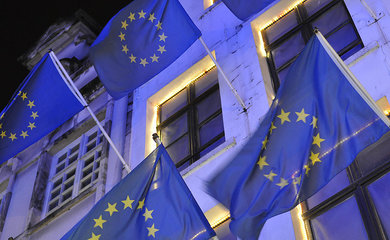Syria’s refugee crisis is nothing new. It has been a serious humanitarian crisis for about four years now and it has only been getting worse. Throngs of Syrians fleeing a very destructive and horrific war have filled camps in neighbouring countries and promises by the world community to do something comprehensive to deal with this issue has been mostly talk. The host countries have spent large sums hosting these refugee populations and trying to cope with this enormous humanitarian crisis.
Then they started going for Europe. This led to many divisive political debates over how this influx should be addressed. German Chancellor Angela Merkels’ readiness to absorb hundreds-of-thousands (an estimated total of one million refugees are expected to arrive in Germany this year) of these refugees into Germany led to substantial controversy and backlash and now it seems she is seeking to stem the flow of refugees into Europe at their source: Turkey.
Turkey hosts the largest population of Syrian refugees, approximately 2.2 million, and has been particularly annoyed with how the world has responded to the Syrian crisis to date. It has also spent billions on catering to the basic needs of its refugee population and didn’t seem too bothered that many of them are scrambling to go to Europe. And not just from the refugee camps, Turkey in recent months has become a conduit through which many people from other countries afflicted by political strife or war are going through to get into Europe. Merkel desperately wants to control this situation, and she has something to offer the Turks that might incentivize them to help her do so.
It’s no secret that, for years now, Turkey under premier Recep Tayyip Erdogan has sought membership in the European Union. However it has been denied entry for a plethora of reasons, despite the fact it lived up to a lot of the qualifying criteria set by the EU in relation to Cyrus, the Kurdish question and assorted human rights-related issues. Some of the reasons have been highly questionable and some of the reasons raised in Europe for denying the Turks entry have bordered on racism–the most striking in my view being former Pope Benedict’s pronouncement that Turkey should be denied entry on the ground that it was a Muslim country which would not fit into a predominantly Christian community.
In addition to being refused entry to date ordinary Turks have been subjected to, in my view, wholly unnecessary obstacles to even visiting Europe. Turks wanting to get a visa have often had to wait lengthy periods, submit unnecessarily large amounts of documentation, endure lengthy delays and mistreatment and then be given visas that only permit them to take short trips. A deplorably impolite and unwelcoming policy for any country to uphold in stark contrast to the open and welcoming Turkish visa policy towards EU citizens. This scribbler for example, as an “EU citizen”, can readily get a 90 day tourist visa online within a matter of minutes for a meagre €15.
Merkel has said she isn’t ready to give Turkey full entry into the EU. However she does seem prepared for a trade-off. In return for reopening serious membership talk, that could well see to Turkey’s admission as the EU’s 29th member in the not too distant future, and an EU grant of €3 billion to help Turkey curb the flow of incomers coming to Europe from their national territory and to better enable Turkey to host the millions of refugees there.
This solution will doubtful displease a lot of people who will perceive it as blackmail on the part of Turkey. I have mixed views. For one I’d like to see the half-baked excuses for forbidding Turkey’s entry done away with. That being said, if Turkey’s entry is predicated primarily on this trade-off I’d be alarmed if other things were overlooked by the EU. Such as the internal political crisis in Turkey and Mr. Erdogan’s manic bid to establish an autocratic presidential-system in replacement of the existing parliamentary one. The EU should not admit countries whose governments repress their opponents politically into the union. Furthermore it should insist that Ankara take more strenuous steps to re-initiate peace talks with the Kurdistan Workers Party (PKK) group and find a peaceful solution to that recently reignited conflict which is destabilizing Turkey to the point that some wonder if it is currently undergoing a process of “Syrianization.”
Then and only then should the EU seriously consider Turkey’s application. Anything less would be a grave injustice in my view to both Turkey, its people, and the European community.
Photo by Matt May, licensed under a Creative Commons Attribution 2.0 Generic license

